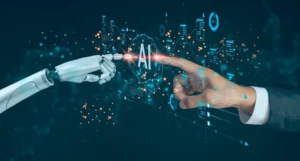The Rise of AI Agents: Will We All Have Digital Employees?
🧠 Introduction: Enter the Age of Digital Employees
Imagine waking up, checking your calendar, and discovering that all your emails were answered, your meetings scheduled, your social media managed, and your sales leads contacted — all while you slept. No, this isn’t a futuristic dream. It’s the reality AI agents are bringing to life. These intelligent, task-performing bots are not just assistants anymore — they are becoming digital employees.
As AI agents evolve rapidly, from OpenAI’s GPT-4o to Auto-GPTs and enterprise-level AI copilots, we’re witnessing the dawn of a new workforce. But will AI agents eventually become standard across all businesses, startups, and even personal life? Will we all manage a team of digital employees in the next decade?
Let’s explore this transformation and what it means for work, business, and society.
🤖 What Are AI Agents?
AI agents are autonomous or semi-autonomous programs that can take input, make decisions, perform tasks, and learn from feedback. Unlike chatbots that only respond, AI agents can initiate actions and carry out complex workflows.
Key Characteristics:
-
Goal-oriented behavior (e.g., scheduling meetings, managing inventory)
-
Memory to recall past actions or preferences
-
Learning capabilities via machine learning
-
Interactivity across platforms (email, Slack, CRMs, APIs)
Popular Examples:
-
Auto-GPT – multi-step reasoning AI
-
ChatGPT with tools – browsing, code execution, file handling
-
Claude + Perplexity Agents – knowledge workers powered by LLMs
-
Microsoft Copilot, Google Duet – enterprise AI copilots
-
Devin by Cognition AI – AI software engineers
🏢 From Assistants to Digital Employees
Initially, AI tools assisted with content, translation, and summarization. Now, they are moving into operational, strategic, and executive tasks.
Use Cases of AI Agents as Digital Employees:
| Industry | AI Agent Role |
|---|---|
| Marketing | Run entire campaigns, A/B test, analyze metrics |
| Sales | Prospecting, follow-ups, lead scoring |
| HR | Resume screening, onboarding, employee engagement |
| Development | Debugging, code generation, deployment |
| Customer Support | 24/7 chat, ticket resolution, sentiment analysis |
| Personal Productivity | Email triage, scheduling, note-taking |
“The future of work isn’t humans vs AI. It’s humans with digital employees.”
🧩 How AI Agents Work (A Simple Breakdown)
AI agents typically have these components:
-
LLM (Large Language Model) like GPT or Claude
-
Task manager or orchestrator (LangChain, CrewAI, Autogen)
-
Tools or plugins (web browsing, APIs, databases)
-
Memory/Vector store (Pinecone, Weaviate)
-
User Interface (chat, voice, command line, app)
They work like this:
-
Receive a user goal (e.g., “Schedule a podcast with top 5 AI founders”)
-
Break it into subtasks
-
Use tools + memory to carry out each task
-
Refine results and report back
💼 The Business Case: Why Digital Employees Are Inevitable
1. Cost Savings
-
Hire once, scale infinitely
-
No benefits, vacations, or office space
2. Productivity Boost
-
Work 24/7 without burnout
-
Multitask across projects
3. Consistency
-
No emotional fatigue, no errors due to mood or bias
4. Speed of Execution
-
AI agents can execute thousands of API calls or emails in seconds
Businesses that don’t adopt digital employees risk falling behind in efficiency, output, and innovation.
🌍 Will Everyone Have AI Agents?
Yes — and not just in business. AI agents are rapidly becoming part of personal productivity stacks as well.
Use Case: Personal Life
-
Personal health agents – track diet, exercise, medical records
-
Finance bots – monitor investments, budgeting, taxes
-
Learning copilots – explain difficult topics, suggest courses
-
Parenting agents – educational planning, schedule management
Think of a future where:
-
Every entrepreneur has 10 agents doing customer research, outreach, and content
-
Every student has a tutor-agent analyzing their performance and guiding learning
-
Every citizen has a policy agent advocating for their needs
🛡️ Challenges & Risks
While digital employees seem like a dream, there are real concerns:
1. Job Displacement
-
Entry-level roles (virtual assistants, junior analysts) are at risk
-
Need for reskilling & AI-human collaboration
2. Trust & Hallucination
-
AI agents can make confident errors
-
Autonomy without oversight = potential disaster
3. Security & Privacy
-
Agents access sensitive information
-
Robust permissions and encryption needed
4. Bias & Ethics
-
AI may reflect biases in data
-
Hard to audit decision-making chains
“We need AI agents that are transparent, auditable, and aligned with human values.”
🔮 The Future of Work with AI Agents
Phase 1 (2023–2025): Co-pilots & Assistants
-
Widespread adoption in enterprise settings
-
Agents remain supervised by humans
Phase 2 (2025–2028): Autonomous Teams
-
Cross-agent collaboration (e.g., Sales agent + Marketing agent)
-
Managers oversee workflows, not tasks
Phase 3 (2028–2035): Hybrid Organizations
-
Digital + human employees working side-by-side
-
AI agents get “personhood rights”? Debated!
📈 Startups & Platforms Leading the Way
Some companies are racing to build agent ecosystems:
-
OpenAI – GPTs and Assistants API
-
LangChain, Autogen, CrewAI – orchestration frameworks
-
Rewind.ai, Heyday, Notion AI – productivity copilots
-
Cognition AI (Devin) – AI software engineers
-
Meta + Google + Microsoft – building agent ecosystems into OS and cloud
👥 Human Role in an Agent-Powered World
-
Managers become strategy designers and prompt engineers
-
Employees must learn to delegate to AI
-
New jobs emerge: AI trainer, agent wrangler, prompt supervisor
The best employees of tomorrow won’t be those who work the hardest — but those who know how to manage the smartest agents.
🙋♀️ FAQs: AI Agents as Digital Employees
Q1. Are AI agents replacing human workers?
Not entirely. They’re replacing repetitive, rules-based tasks. Humans still lead in creativity, empathy, and strategy. The future is collaboration.
Q2. How can I get started with AI agents?
Start with tools like ChatGPT, Claude, or Perplexity. Use Auto-GPT, CrewAI, or LangGraph if you’re building custom workflows.
Q3. Is it expensive to use AI agents?
Many tools are free or low-cost. For businesses, the ROI is significant — one AI agent can replace 3–5 FTEs in some cases.
Q4. Are AI agents safe to use?
Yes, if used responsibly. Avoid giving them sensitive data unless the platform is secure and audited.
Q5. What skills should I learn to manage AI agents?
Learn prompt engineering, basic automation (Zapier, APIs), and AI ethics. Soft skills like judgment and leadership will remain crucial.
🏁 Conclusion: Your Next Hire May Be an AI
The future is clear: AI agents will become your digital employees. Whether you run a solo business, manage a team, or simply want more time for yourself, these agents are redefining productivity and reshaping the workforce.
The question isn’t if we’ll all have digital employees — it’s how soon.
🔍 FAQs about AI Agents as Digital Employees
1. What exactly is an AI agent?
An AI agent is an autonomous or semi-autonomous software entity built using large language models (LLMs) and tool integration (e.g., browsing, scheduling, API access). It can accept user instructions, plan steps, execute tasks, and learn from its experiences—similar to how a human employee would operate.
2. Why are AI agents being described as “digital employees”?
Unlike traditional AI tools that only assist, AI agents can initiate tasks, adapt workflows, and act independently. They can handle entire responsibilities—such as outreach, content creation, or data analysis—making them more akin to employees than simple assistants.
3. How can businesses benefit from using AI agents?
AI agents offer:
-
Cost efficiency by reducing the need for entry-level hires.
-
Productivity gains through true multitasking.
-
24/7 operation, eliminating delays.
-
Scalability, enabling rapid expansion without traditional HR overhead.
4. Will AI agents replace human jobs?
Partially. Roles involving repetitive tasks—such as scheduling, first-tier support, or drafting—are most at risk. However, humans remain essential for creativity, strategy, emotional judgment, and leadership. The new model encourages human-AI collaboration.
5. What platforms are leading the agent market today?
Key platforms include:
-
Auto-GPT, CrewAI, LangGraph for workflow orchestration.
-
Enterprise copilots like Microsoft Copilot, Google Duet, Claude with tools.
-
Specialized agents such as Devin by Cognition AI (software development) and agents for marketing, HR, or support functions.
6. Are AI agents safe to use in business operations?
Yes—when implemented responsibly. This means:
-
Using secure and audited platforms.
-
Regularly reviewing AI outputs for accuracy.
-
Limiting access to sensitive data and employing permission boundaries.
-
Staying alert to potential bias or hallucinations in responses.
7. Do AI agents require coding skills?
Not necessarily. Some agents—like basic GPT chatbots—require no coding. Others, particularly custom agents using orchestration frameworks, may require knowledge of tools like LangChain and basic scripting. But many platforms are making setup increasingly user-friendly.
8. How do AI agents learn and improve?
AI agents learn through:
-
Reinforcement learning with human feedback (RLHF).
-
Prompt refinement by developers or users.
-
Agent self-optimization, where they iteratively improve workflows based on outcomes.
-
Data clustering or memory storage, helping agents remember user preferences and context.
9. What skills should individuals develop for an AI-driven workplace?
Important skills for the AI future include:
-
Prompt engineering (crafting effective instructions).
-
AI oversight and evaluation (detecting errors or bias).
-
Ethics, empathy, critical thinking—skills machines struggle to replicate.
-
Tool integration knowledge (e.g., APIs, automation platforms).
10. Could a household eventually manage digital employees?
Absolutely. Many personal tasks—budget management, travel planning, digital content creation, learning—can be handled by AI agents. We’re already seeing personal AI assistants performing tasks traditionally done by virtual assistants, albeit at a much higher scale and speed.
https://bitsofall.com/future-of-human-relationships-in-an-ai-first-world/
https://bitsofall.com/reinforcement-learning-ai-2025/
Top AI Use Cases in 2025: Transforming Industries with Smart Solutions




